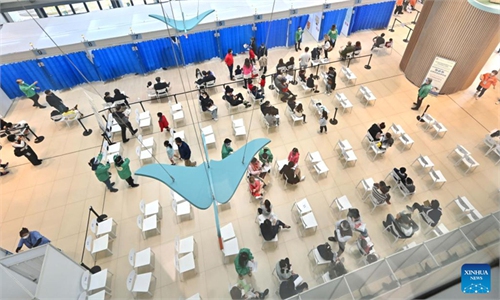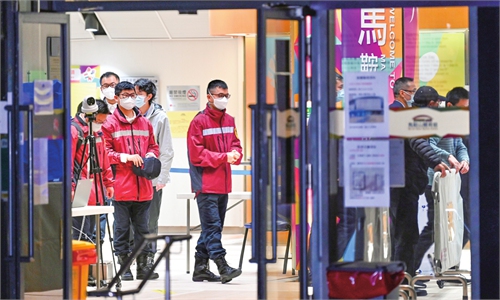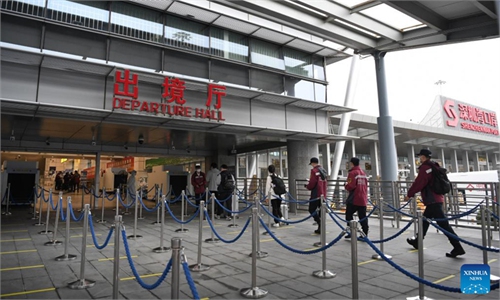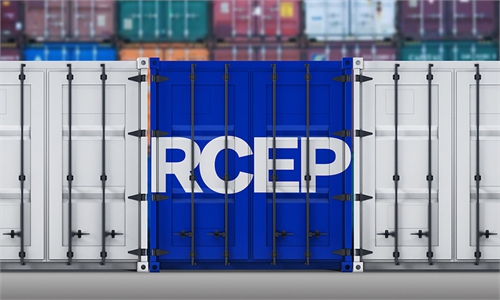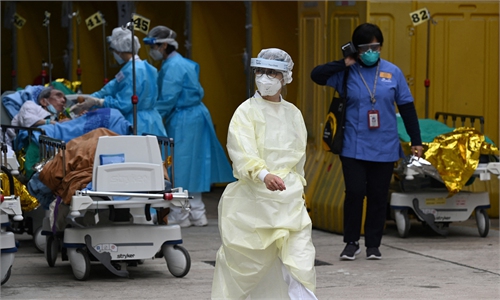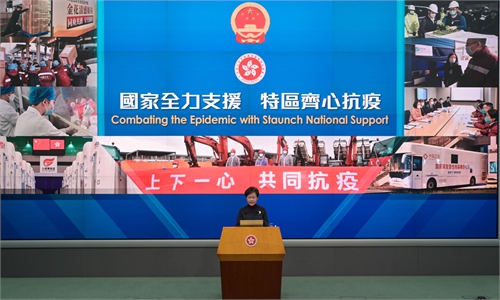Exclusive: Hong Kong takes mainland zero-COVID policy as ‘successful’; advised to take stricter measures: HK Hospital Authority chief
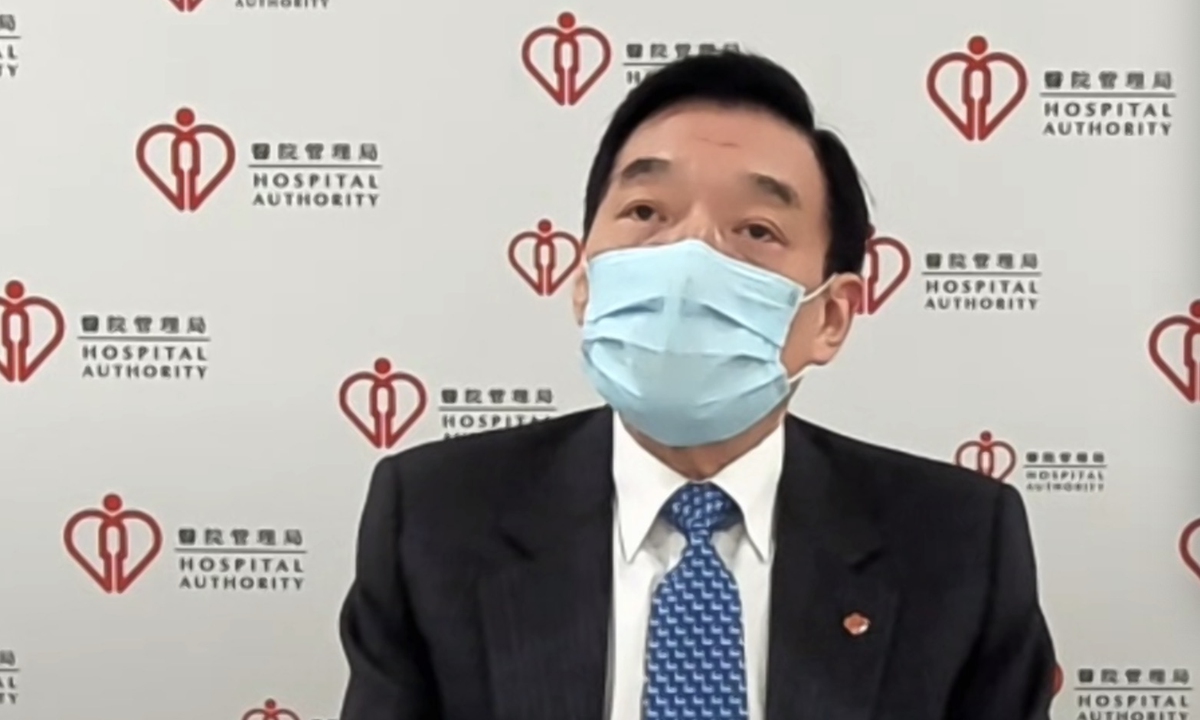
Fan Hung-ling, chairman of the Hong Kong Hospital Authority, in interview with GT on Feb 23, 2022.
Hong Kong has been recording surging COVID-19 infections in recent days, heavily weighing on its local public health system, regarding which Fan Hung-ling, chairman of the Hong Kong Hospital Authority, told the Global Times on Wednesday that Hong Kong society acknowledged shortcomings in dealing with the epidemic ahead of the fifth wave, and the city has to learn from the Chinese mainland in its dynamic zero-COVID policy in tracking patients, increasing medical resources like temporary hospitals, and rigorously carrying out quarantine measures.
Following the announcement of the Hong Kong Special Administrative Region (HKSAR) government on Tuesday in launching mandatory mass nucleic acid testing covering about 7.3 million local residents in March, Fan said the policy is a step in the right direction as it aims to screen all the undetected and hidden cases within the community, "which is on the top of our priorities now."
The confirmed cases need to be put into quarantine as soon as possible, and COVID-19 patients have to be treated in a timely way, but the problem now is that the medical system in Hong Kong has been overwhelmed, Fan noted.
"We have 3,600 hospital beds, which are now in full use. In terms of quarantine facilities, there are about 5,000 quarantine places. The first step of the government is to raise the number to 20,000, which is not enough, though, if we have daily new cases of 7,500. We need to construct more quarantine facilities," he said.
With the help of the central government, the four Fangcang makeshift hospitals supported by the central government are being constructed in Tsing Yi, Yuen Long and Hung Shui Kiu, which are expected to provide 14,000 to 17,000 quarantine places for Hong Kong residents. The one in Tsing Yi would be put into use in a week.
"We are not capable of receiving all the patients, for now, as the size of our quarantine facilities could not match the growth rate of new infections. But with the firm support of the central government, I am confidence of conquering this crisis," Fan said.
Hong Kong reported 8,674 new confirmed cases on Wednesday with a new death toll of 24. The city's cumulative confirmed cases surpassed 66,000 as of Tuesday, exceeding the total cases in Wuhan, Central Hubei Province, which was the first city hit by the epidemic.
"Insisting on the dynamic zero-COVID strategy is our country's basic policy, which we won't change. And we have to follow in its steps by taking stricter measures," Fan said, noting that as there are more than 800 medical staff who have been infected, and most of them were infected within communities, local authorities are studying the experience of the mainland.
"We are now studying the flexibility of putting medical staff in key positions into a closed loop, like what mainland hospitals do, which is a very valuable experience," he said, adding that there's no single case of medical staff infection being caused by treating COVID-19 patients.
Also, the HKSAR authorities have been studying the way to track positive cases, for example, by taking the example of the health code mechanism in the mainland.
"The health codes work much more effectively compared with LeaveHomeSafe, which wastes much time of waiting residents to report cases to authorities instead of tracking down the cases. Given the severe epidemic situation now in Hong Kong, the HKSAR government, the hospital authority and Hong Kong residents are realizing that the model used in combating the COVID-19 outbreak in the mainland is successful," Fan said.
Hong Kong will soon start compulsory mass testing and officials expect that at least the overall testing volume in Hong Kong will reach 1 million every day, which can only be achieved with the help of thousands of medical staff to conduct tests, dispatched by the city's neighboring Guangdong Province.
While lockdowns - another experience from the mainland's fight against COVID-19 - have proven to be effective in containing the virus' spread, Fan admitted that it's difficult for Hong Kong to do so. "The HKSAR government is adopting a compromised way in order to lower the risks," he said.
Some medical experts also pointed out that a city lockdown may not be a suitable measure for Hong Kong. Unlike the mainland's communities, there have been no strong top-down community network and social workers who ensures the supplies of life necessities to every household.
As soon as local authorities find more positive cases, they need to put them into quarantine places to cut off the transmission in communities. "However, we are already facing a shortage of manpower," the chairman of the authority noted.
"We hope more private hospitals could join us in this fight, and the central government could dispatch more medical staff from the mainland, probably from 3,000 to 5,000 in the first batch besides thousands of nucleic acid testing staff, to support our Fangcang makeshift hospitals and quarantine sites," Fan said.
In following the dynamic zero-COVID policy, Hong Kong needs to draw lessons from its handling of the fifth wave. For example, it needs to reserve some temporary hospitals, to learn how to effectively treat severely ill patients from mainland experts, and increase its efficiency in mass testing.
"After the fifth wave, there might be a sixth wave. We need to learn from those experiences in order to be well prepared for the resurgence in future," he said.

